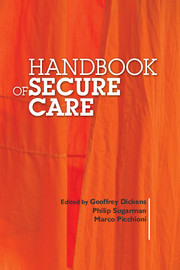Book contents
- Frontmatter
- Contents
- List of tables, boxes and figures
- List of contributors
- Preface
- 1 The evolution of secure and forensic mental healthcare
- 2 Mental disorder and offending
- 3 Clinical risk assessment in secure care
- 4 Risk management in secure care
- 5 Recovery in secure environments
- 6 Personality disorder
- 7 Women's mental health, aggression and offending
- 8 Offenders with intellectual disability in secure services and the criminal justice system
- 9 Secure mental healthcare for young people
- 10 Secure care for people with autism spectrum disorder
- 11 Acquired brain injury, trauma and aggression
- 12 Managing aggression and violence in older people
- 13 Firesetting in secure settings: theory, treatment and management
- 14 Specialist psychological treatment programmes in secure mental healthcare
- 15 Nursing in secure mental healthcare settings
- 16 Prescribing for specialist populations
- 17 Human rights in secure psychiatric care
- 18 Quality assurance and clinical audit in secure psychiatric care
- 19 Psychological support following violent assault and trauma: what works for staff in secure settings?
- Index
11 - Acquired brain injury, trauma and aggression
Published online by Cambridge University Press: 02 January 2018
- Frontmatter
- Contents
- List of tables, boxes and figures
- List of contributors
- Preface
- 1 The evolution of secure and forensic mental healthcare
- 2 Mental disorder and offending
- 3 Clinical risk assessment in secure care
- 4 Risk management in secure care
- 5 Recovery in secure environments
- 6 Personality disorder
- 7 Women's mental health, aggression and offending
- 8 Offenders with intellectual disability in secure services and the criminal justice system
- 9 Secure mental healthcare for young people
- 10 Secure care for people with autism spectrum disorder
- 11 Acquired brain injury, trauma and aggression
- 12 Managing aggression and violence in older people
- 13 Firesetting in secure settings: theory, treatment and management
- 14 Specialist psychological treatment programmes in secure mental healthcare
- 15 Nursing in secure mental healthcare settings
- 16 Prescribing for specialist populations
- 17 Human rights in secure psychiatric care
- 18 Quality assurance and clinical audit in secure psychiatric care
- 19 Psychological support following violent assault and trauma: what works for staff in secure settings?
- Index
Summary
Introduction
Outcome from acquired brain injury is characterised by a range of physical, functional, cognitive, behavioural and psychosocial problems. Behaviour disorders are enduring and create severe difficulties for patients and their families (Hall et al, 1994). The term ‘neurobehavioural disability’ is used to highlight the combination of neurological and neuropsychological origins of deficits in behaviour observed among survivors of acquired brain injury (Wood, 1990). The condition comprises elements of executive and attentional dysfunction, poor insight, problems of awareness and social judgement, labile mood, poor impulse control and a range of personality changes (Wood, 2001). These result in serious long-term social handicap and poor psychosocial outcome (Kreutzer et al, 1996).
Among the constellation of symptoms of neurobehavioural disability, aggression is the most overt and debilitating (Fleminger et al, 2006). It creates special challenges in rehabilitation units and constrains achievement of rehabilitation potential (Burke et al, 1988). Some individuals are excluded from rehabilitation altogether (Prigatano, 1987). When this happens, people with acquired brain injury gravitate to placements for management purposes that are ill-equipped to meet their rehabilitation needs, including forensic services (Alderman, 2001).
Prevalence and progression of aggression after acquired brain injury
Aggressive behaviour is a legacy of acquired brain injury that has particularly damaging effects, but how characteristic a consequence it is remains uncertain. Tateno et al (2003) established that reports in the literature of aggression among survivors of traumatic brain injury varied from 11 to 96%. In their own study, 33.7% had engaged in significant aggressive behaviour within 6 months of injury. Baguley et al (2006) investigated outcome among a large sample of survivors of traumatic brain injury at 6 months, 24 months and 5 years post-injury. Each time, 25% met the study's criteria for ‘significant’ aggressive behaviour. They concluded it was a frequent and long-term sequela of traumatic brain injury. Kelly et al (2008) investigated challenging behaviour profiles of people with acquired brain injury living in community settings. Aggression was very characteristic, with nearly 86% engaging in verbal aggression, 41.1% in assaults on other people and 35.3% in physical aggression towards objects. This study also highlighted longevity of aggression as mean time since injury was nearly 10 years, with the longest being 41.3 years.
- Type
- Chapter
- Information
- Handbook of Secure Care , pp. 163 - 178Publisher: Royal College of PsychiatristsPrint publication year: 2015



